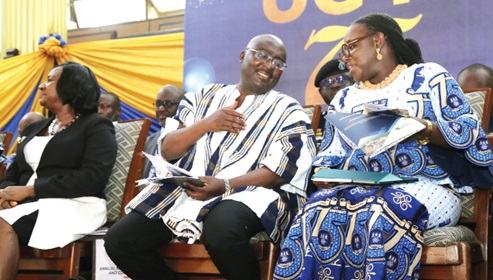
Digital devices necessity for 4th industrial revolution — Dr Bawumia
The Vice-President, Dr Mahamudu Bawumia, has stressed the need to make access to digital devices a necessity, not a luxury, to make the country competitive in the fourth industrial revolution, hinged on digital technology.
“We have to take that approach by ensuring that we have availability of digital devices across our tertiary institutions,” he stated.
Speaking at the opening session of the Annual New Year School and Conference at the Great Hall of the University of Ghana yesterday, Dr Bawumia charged the university to be at the forefront of knowledge production in the development of groundbreaking and cutting-edge technologies tailored to respond to specific challenges and sectors to accelerate national development.
Recommendations
The Vice-President expressed the hope that recommendations from the three-day conference would put the country in pole position for accelerated development, enabled by technology and anchored on humanism towards a resilient economy for generations unborn.
Dr Bawumia, therefore, urged well-meaning individuals and institutions to contribute generously towards the one-student, one-laptop initiative, classroom modernisation and the construction of hotspot comfort zones at the university to provide ideal locations for the relaxation of students and the university community.
New Year School
The 75th edition of the Annual New Year School and Conference is being organised by the School of Continuing and Distance Education of the College of Education, University of Ghana.
On the theme: “Nurturing resilience; adopting technology and embracing humanism for sustainable development,” it is being attended by policy makers, representatives from academia, business leaders and civil society organisations, among others.
Touching on humanism, Dr Bawumia said by enhancing humanism, “we do not only enhance our overall resilience, but also establish a robust foundation, laying the path for sustainable development that is inclusive, compassionate and unequivocally beneficial for all humanity present.”
The significance of fully adopting humanism, the Vice-President added, lay in the shared commitment of the country to future generations, a way-of-life mindset and a key to a future that is sustainable, inclusive and prosperous.
Elections
Sharing a few points on elections, Dr Bawumia said the local governance system of the country had come a long way, spanning a little over 31 years of its existence in the fourth republic.
“As we look round our communities and districts, there is clear evidence that some progress has been made in the development equation,” he stressed.
In spite of the achievements by successive governments, the Vice-President said, there were persisting challenges that called for both attitudinal and systemic reforms, stressing that reforming the systems to trigger developments and bridging the transformational gap was long overdue.
Dr Bawumia, however, commended civil society and all other organisations whose works had contributed to research and consultation over the last decade or more with pragmatic proposals to transform Ghana's local governance system to make it fit for purpose in the new millennium.
The Vice-President further gave an assurance that the government would engage to make the necessary changes.
Great strides
The Vice-Chancellor of the University of Ghana, Professor Nana Aba Appiah Amfo, said through the commitment of management and students and the benevolence of well-meaning individuals and institutions, the university had made great strides in actualising digitalisation initiatives.
She said 475 laptops meant for economically challenged students had been received, out of which 309 had been distributed, with 166 pending for distribution.
Prof. Amfo said UG had also made sufficient efforts to upgrade its technological devices on all its campuses, including the construction of a digital youth village intended to deliver a first-class information and communication technology (ICT) facility to unleash the IT potential of the youth in the country.
The Vice-Chancellor said the university had embraced technology not only as part of its work processes, but as an integral part of its institutional culture.
The Vice-Rector for Research at the Tallinn University, Estonia, Professor Katrin Niglas, who shared her thoughts on the topic: “Education in Estonia, our success story,” indicated that both Estonia and Ghana had similar goals in education.
Prof. Niglas expressed confidence in the use of technology and digital devices to develop and improve the quality of education.
He said it was evident in Estonia that people were taking their education seriously due to the massive infusion of digitalisation in its education system.
In a speech read on her behalf, the Chancellor of the University of Ghana, Mary Chinery-Hesse, indicated that the strategic adoption and integration of technology could bridge infrastructure gaps, empower communities and contribute to sustainable progress.
She observed that embracing technology as a country would also unlock opportunities for innovation, entrepreneurship and the overall societal advancement.
Mrs Chinery-Hesse added that adopting technology was particularly relevant for the youth, as it served as a catalyst for empowerment, education and economic advancement.
